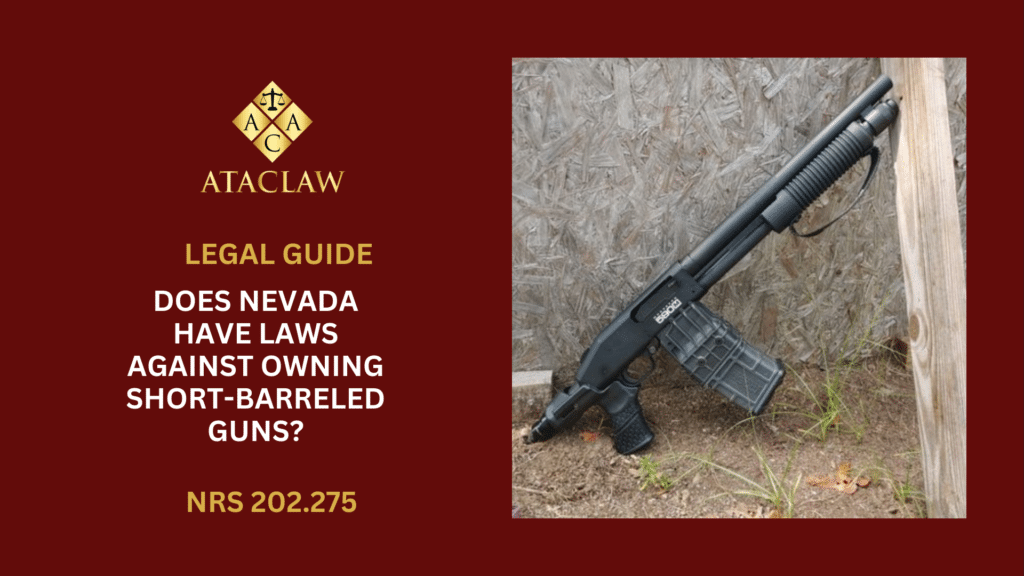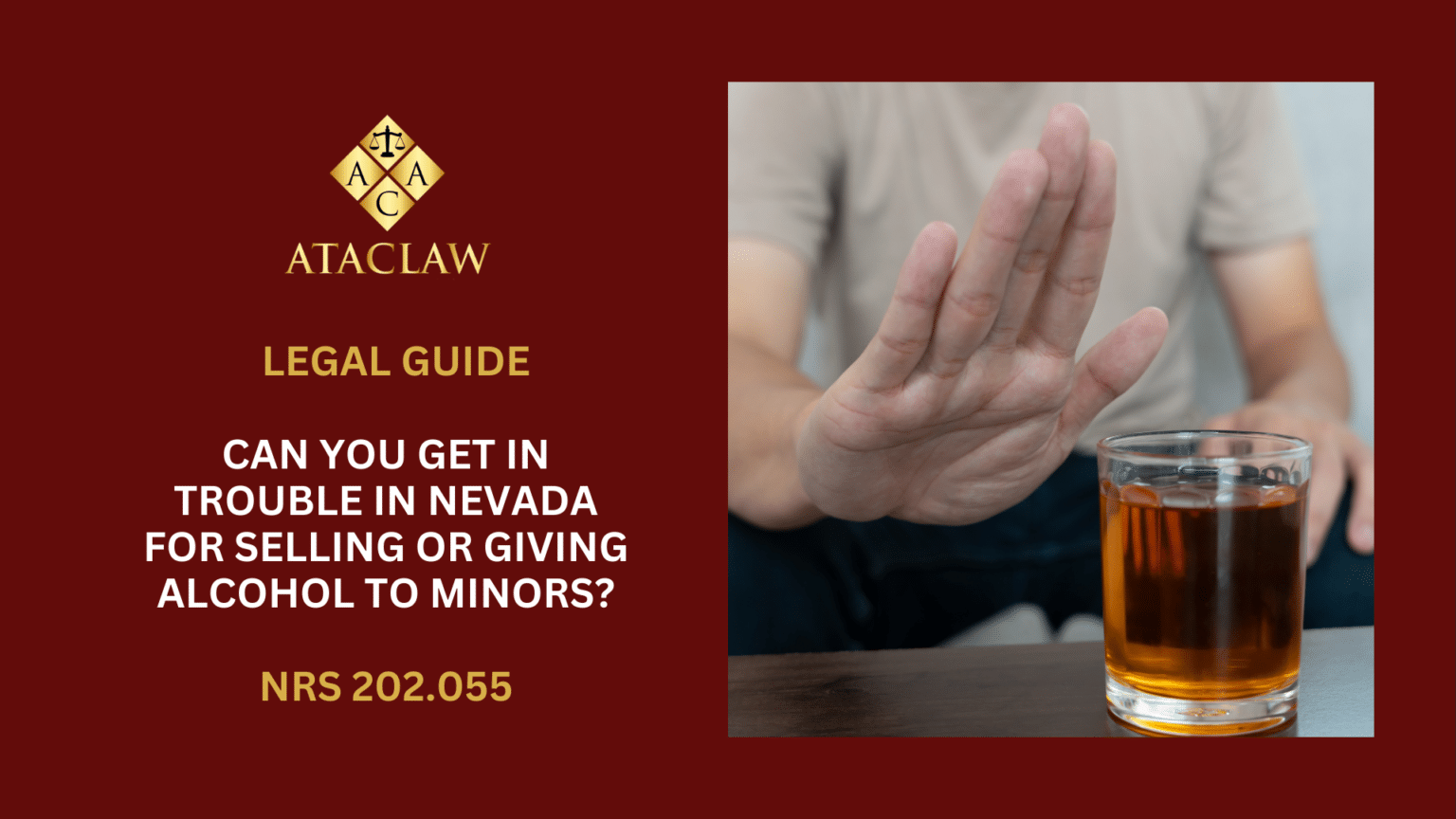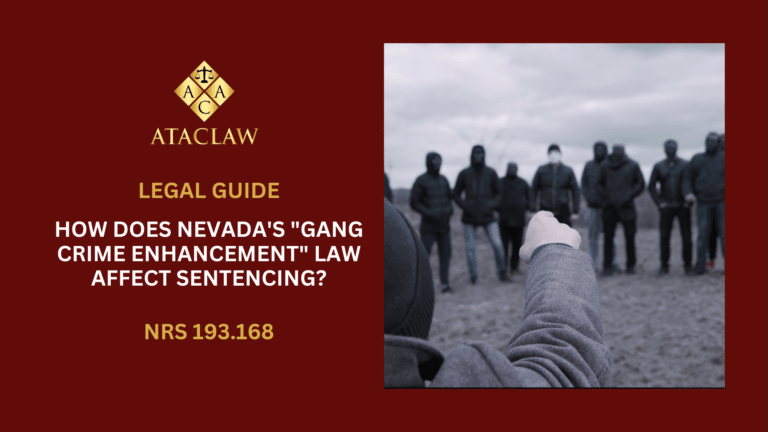The rules surrounding firearm possession in Nevada are strict and carefully enforced to ensure public safety. Among these laws, NRS 202.275 specifically addresses the ownership and handling of certain types of firearms that could pose higher risks if used improperly. As responsible citizens and lawful residents of Nevada, it’s crucial to understand what the law says about short-barreled rifles and shotguns. ATAC LAW breaks this down to help you stay informed and compliant.
Nevada law, under NRS 202.275, clearly states that it is illegal to knowingly or willfully possess, manufacture, or dispose of any short-barreled rifle or short-barreled shotgun. This legislation categorizes the unauthorized handling of these specific firearms as a serious offense due to their easy concealability and the potential danger they pose.
Is Owning a Short-Barreled Rifle or Shotgun Legal in Nevada?
In the state of Nevada, the definitions and legal status of certain firearms come under stringent regulations. Specifically, short-barreled rifles and shotguns are subject to particular scrutiny. Here’s a clearer understanding of what these firearms entail and the legality surrounding them, brought to you by ATAC LAW.
A short-barreled rifle in Nevada is defined by two principal characteristics:
- It features a barrel or barrels under 16 inches in length.
- It is a modified rifle that now has an overall length of less than 26 inches.
Similarly, short-barreled shotguns are recognized under the following conditions:
- The barrel or barrels measure less than 18 inches.
- The weapon, originally a shotgun, has been altered to an overall length of less than 26 inches.
Collectively referred to as “short-barreled” firearms, such guns carry a prohibited status in Nevada when it comes to their possession, creation, or disposal. However, it’s important to note that there are exceptions to this rule, which we will explore further down.
Often referred to colloquially as “sawed-off shotguns,” these compact firearms are regulated strictly for the safety concerns they present due to their powerful capability and the ease with which they can be concealed.
Understanding these definitions and limitations is crucial for Nevada residents and firearm owners to ensure compliance with state laws and avoid unintentional legal issues. Stay informed and ensure your firearm ownership falls within the legal boundaries set by Nevada law.
Are Short-Barreled Shotguns or Rifles Permissible Under Nevada Law?
For most residents in Nevada, owning a short-barreled shotgun or rifle is typically off-limits. However, the state does recognize specific exceptions. Detailed by ATAC LAW, here are the individuals who may legally handle these restricted firearms:
- Owners with short-barreled rifles or shotguns registered with the U.S. Department of the Treasury fall within the lawful category.
- Additionally, anyone in possession of these guns is deemed as curios or relics by the stipulations of 18 U.S.C. Chapter 444 is permitted to own such firearms.
- Authorized peace officers performing their designated duties have the right to possess short-barreled firearms.
- Individuals who have secured licensure as a firearm importer, manufacturer, collector, or dealer from the U.S. Department of the Treasury are also exempt.
- Collectors owning short-barreled rifles or shotguns that are officially recognized as collector’s items under the guidelines of 26 U.S.C. Chapter 53 has a safe harbor under the law.
Why Does Nevada’s Law on Short-Barreled Firearms Matter?
Nevada’s laws regulating short-barreled firearms are crucial for several reasons:
- Public Safety: Restrictions on certain types of weapons, including short-barreled firearms, often stem from concerns regarding public safety. These firearms are considered potentially more dangerous due to their ease of concealment and maneuverability, thus the law aims to prevent their misuse.
- Legal Compliance: Law-abiding citizens and gun owners need to be aware of these specific statutes to avoid unintentional violations, which can result in serious legal consequences.
- Criminal Justice Impact: Convictions under firearm regulations can have severe repercussions, affecting individuals’ freedom, right to own firearms, and even immigration status. Understanding these laws is key to preventing infractions that could lead to life-altering consequences.
- Informed Community: Being educated on firearm regulations promotes a community that is informed and respectful of the law, which in turn fosters a cooperative relationship between citizens, law enforcement, and the judicial system.
What Are the Consequences of Having a Sawed-Off Shotgun or Rifle in Nevada?
In Nevada, handling a sawed-off shotgun or rifle is not taken lightly under the law. Specifically, breaching NRS 202.275 by possessing, creating, or distributing a short-barreled firearm is classified as a category D felony. ATAC LAW outlines the potential repercussions for such actions:
- Individuals found guilty can face incarceration ranging from 1 to 4 years in a Nevada State Prison.
- Additionally, there is a monetary penalty involved, where the offender may be subjected to fines up to $5,000, based upon the judgment of the presiding judge.
Understanding the severity of these penalties underlines the importance of complying with Nevada’s firearms laws. If you find yourself in a situation where you’re unsure of the legality of a firearm, or if you’re facing charges related to illegal firearms possession, reaching out to legal professionals like ATAC LAW is crucial.
Can Gun Crimes Affect Immigration Status in the U.S.?
Non-citizens face significant risks if convicted of firearm offenses, including potential deportation. Immigrants charged with gun-related crimes should aim to have their charges reduced to non-deportable offenses to avoid being summoned to immigration court, alongside criminal proceedings.
What Defenses Can Be Used Against Charges Under NRS 202.275 in Nevada?
Defending against charges of possessing, manufacturing, or disposing of a short-barreled shotgun or rifle under NRS 202.275 involves several potential legal strategies. Here are some common defenses:
- Lack of Knowledge: Arguing that the accused was unaware they possessed or controlled a short-barreled firearm.
- Ownership Dispute: Demonstrating that the firearm did not belong to the accused or that they did not have control over the firearm.
- Legal Exemption: The accused might be part of a group that is legally allowed to own such firearms, such as law enforcement officers or licensed firearms dealers.
- Unintentional Possession: The firearm was possessed accidentally or without the intent to keep or use it.
For anyone facing such charges, consulting with a legal firm like ATAC LAW can provide crucial guidance and representation to navigate through the complexities of the law and explore all possible defenses.
How Soon Can a Criminal Record Be Sealed After a Conviction Under NRS 202.275 in Nevada?
Individuals convicted under NRS 202.275 in Nevada, which relates to the possession, manufacturing, or disposal of short-barreled shotguns or rifles, can seek to seal their criminal records. This option becomes available five years after the conclusion of the case. However, if the charges are dismissed, the individual has the right to petition for immediate sealing of their record.
At ATAC LAW, we understand the complexities of firearm laws in Nevada. If you or someone you know is facing charges related to the possession, manufacture, or disposal of a short-barreled rifle or shotgun, it’s essential to seek knowledgeable legal counsel immediately. Our experienced attorneys are here to provide robust defense and guidance to ensure your rights are protected every step of the way.
For more information about firearm laws and legal defense in Nevada, contact ATAC LAW today or visit our website for more insights and legal assistance.
For further legal assistance and to discuss your case with an expert, don’t hesitate to contact ATAC LAW.




